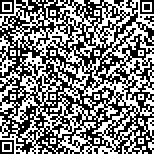| 引用本文: |
刘颖,张慧敏,袁书贤,向南,李敏.鼻炎康汤治疗CRS胆腑郁热证的疗效及对患者鼻黏膜纤毛传输速率的影响[J].湖南中医药大学学报,2018,38(10):1169-1172[点击复制] |
|
| |
|
|
| 本文已被:浏览 4257次 下载 2138次 |
| 鼻炎康汤治疗CRS胆腑郁热证的疗效及对患者鼻黏膜纤毛传输速率的影响 |
| 刘颖,张慧敏,袁书贤,向南,李敏 |
| (成都中医药大学附属医院耳鼻喉科, 四川 成都 610072;苏州市中西医结合医院耳鼻喉科, 江苏 苏州 215100) |
| 摘要: |
| 目的 观察鼻炎康汤对慢性鼻-鼻窦炎(CRS)胆腑郁热证患者的疗效及对患者免疫功能、鼻黏膜纤毛传输速率(MTR)的影响。方法 将2016年2月至2017年8月在本院接受治疗的CRS患者随机分为对照组和观察组各40例,对照组给予口服克拉霉素缓释片和生理盐水冲洗治疗,观察组在此基础上给予鼻炎康汤治疗。两组均连续治疗4周。观察两组患者的治疗效果,比较两组患者治疗前后细胞因子、免疫指标水平、MTR和生活质量的差异。结果 观察组患者治疗有效率为97.5%,明显高于对照组82.5%(P<0.05);治疗后两组患者的白介素-6(IL-6)、肿瘤坏死因子-α(TNF-α)和超敏反应C蛋白(CRP)水平均较治疗前降低(P<0.05),且观察组低于对照组(P<0.05);治疗后两组患者的免疫球蛋白E(IgE)水平均较治疗前降低(P<0.05),MTR水平均较治疗前升高(P<0.05),且观察组改善优于对照组(P<0.05);治疗后两组生活质量各项指标评分均明显降低(P<0.05),且观察组低于对照组(P<0.05)。结论 鼻炎康汤对CRS患者有较好的治疗效果,可明显改善患者的MTR和生活质量,具有良好的应用价值。 |
| 关键词: 慢性鼻-鼻窦炎 鼻炎康汤 细胞因子 鼻黏膜纤毛传输速率 生活质量 |
| DOI:10.3969/j.issn.1674-070X.2018.10.018 |
| 投稿时间:2018-03-07 |
| 基金项目:四川省教育厅基金资助项目(17ZA0146)。 |
|
| Effect of Biyankang Decoction in Treatment of Chronic Rhinosinusitis Patients with Syndrome of Stagnated Heat of Gallbladder and Its Effect on Nasal Mucociliary Transport Rate |
| LIU Ying,ZHANG Huimin,YUAN Shuxian,XIANG Nan,LI Min |
| (Department of Otorhinolaryngology, Affiliated Hospital of Chengdu University of Traditional Chinese Medicine, Chengdu, Sichuan 610072, China;Department of Otorhinolaryngology, Suzhou Hospital of Integrated Traditional Chinese and Western Medicine, Suzhou, Jiangsu 215100, China) |
| Abstract: |
| Objective To observe the therapeutic effect of Biyankang Decoction in treatment of chronic rhinosinusitis (CRS) patients with the syndrome of stagnated heat of gallbladder, and its effect on immune function and nasal mucociliary transport rate (MTR). Methods Patients with CRS who received treatment in our hospital from February 2016 to August 2017 were randomly divided into two groups:control group (40 subjects) and observation group (40 subjects). Subjects in the control group received oral clarithromycin sustained-release tablets in combination with nasal saline irrigation. The observation group received Biyankang Decoction in addition to the control treatment. The therapeutic effects of the two groups were observed after four weeks of treatment. The differences in cytokines, immune index, nasal MTR, and quality of life (QOL) between the two groups were evaluated before and after treatment. Results The response rate in the observation group was 97.50%, which was significantly higher than that (82.5%) in the control group (P<0.05). After treatment, both groups showed significant decreases in the levels of interleukin-6, tumor necrosis factor-α, and hypersensitivity C-reactive protein (P<0.05), and those indices were significantly lower in the observation group than in the control group (P<0.05). After treatment, both groups showed a significant reduction in the level of immunoglobulin E and a significant increase in the level of MTR (P<0.05), and the observation group had significantly more improvements than the control group (P<0.05). After treatment, the QOL scores of the patients in both groups were significantly reduced (P<0.05), and they were significantly lower in the observation group than in the control group (P<0.05). Conclusion Biyankang Decoction has a promising therapeutic effect in treating patients with CRS, and can significantly improve the MTR and QOL of patients. It holds promise for clinical application. |
| Key words: chronic rhinosinusitis Biyankang Decoction cytokine nasal mucociliary transport rate quality of life |
|

二维码(扫一下试试看!) |
|
|
|
|




